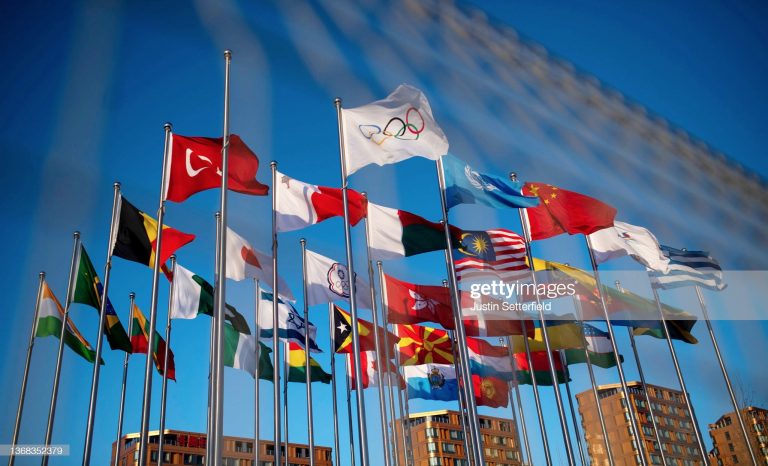The number of world leaders and foreign dignitaries attending the upcoming Winter Olympics in Beijing is lower than in previous years.
China’s poor human rights record has led some countries to implement a diplomatic boycott of the 2022 Beijing Winter Olympics and some are refusing to attend citing reasons such as the COVID-19 pandemic.
Who’s Absent?
White House press secretary Jen Psaki officially announced on Dec. 6 that, “The Biden administration will not send any diplomatic or official representation to the Beijing 2022 Winter Olympics and Paralympic Games given the PRC’s ongoing genocide and crimes against humanity in Xinjiang and other human rights abuses.”
Psaki said, “the athletes on Team USA have our full support. We will not be contributing to the fanfare of the Games.”
“As the President has told President Xi, standing up for human rights is in the DNA of Americans. We have a fundamental commitment to promoting human rights. And we feel strongly in our position, and we will continue to take actions to advance human rights in China and beyond.” Jen Psaki added.
Success
You are now signed up for our newsletter
Success
Check your email to complete sign up
The U.S. boycott, protesting China’s human rights record, has been joined by numerous other nations including Australia, Britain, Canada, the UK, and Japan.
Japan is only assigning three people to Beijing, including Tokyo Organizing Committee Chairman Soko Hashimoto.
Both Lithuania and Kosovo have also announced a diplomatic boycott of the games.
In North Korea, Pyongyang says it will not participate in the Winter Olympics due to a “conspiracy of hostile forces” and the COVID-19 outbreak. It means that North Korean athletes will also miss the games.
Danish Foreign Minister Jeppe Kofod announced on Jan. 14 that Denmark will not be sending an official diplomatic delegation to the Beijing 2022 Winter Olympics due to human rights issues in the host country.
“It is no secret that we from the Danish side are very concerned about the human rights situation in China,” Kofod said, adding that, “The government has decided that we will not attend the Winter Olympics in China.”
The Netherlands is also not sending an official diplomatic delegation to the Olympics because of COVID-19 restrictions, a foreign ministry spokesperson said on Jan. 14.
Slovenia has announced a diplomatic boycott of the Beijing Winter Olympics and New Zealand has said that delegates from the country will not be participating, citing the COVID-19 situation.
The Taiwan government said its Winter Olympics delegation would not attend the opening and closing ceremonies of the Beijing Winter Olympics in February, but a group of 15 people, including four participating athletes, will travel to Beijing to participate in the games as normal.
Taiwan did not send officials to the 2008 Summer Olympics in Beijing.
German Foreign Minister Annalena Baerbock said she will not attend the Beijing Winter Olympics and called for an EU-wide ban on importing slave labor products.
German President Frank-Walter Steinmeier has decided not to attend the Winter Olympics in Beijing.
The Switzerland government said that it will not attend the Olympic and Paralympic Winter Games in Beijing stating, “The pandemic situation in Switzerland and the health restrictions imposed by the Chinese authorities to contain the spread of the coronavirus made substantive bilateral meetings and contacts with athletes impossible.”
Austria has declined to send a delegation as well citing the COVID-19 situation and is also joined by Latvia.
Sweden, Estonia, and Belgium have all said they will not be sending delegations to the games citing COVID-19 and “political reasons.”
Swedish Sports Minister Anders Ygeman told Swedish news agency TT, “this is not a diplomatic boycott,” and that they are not sending a delegation to the games due to China’s strict entry restrictions for foreigners during the pandemic.
In Portugal, the Minister of Foreign Affairs Augusto Santos Silva said, “Portugal will not have political representation at the opening and closing ceremonies of the Beijing Winter Olympics for several reasons.”
Who’s going?
According to Reuters, notable leaders from various countries attending the Beijing Winter Olympics are expected to include Russian President Vladimir Putin, the Prince of Saudi Arabia, Mohammed bin Salman bin Abdulaziz Al Saud, Egyptian President Abdel Fattah Al-Sisi, Poland’s President Andrzej Duda, and the Prime Minister of Pakistan, Imran Khan.
Below is a more exhaustive list of countries that will be sending political delegations to the 2022 Beijing Winter Olympics:
Serbian President Aleksandar Vučić
Qatar Emir Sheikh Tamim bin Hamad Al Thani
President of Kazakhstan Kassym-Jomart Tokayev
President of Kyrgyzstan Sadyr Zhaparov
President Emomali Rahmon of Tajikistan
President of Turkmenistan Gurbanguly Berdimuhamedov
Prince of Abu Dhabi, United Arab Emirates, Sheikh Mohamed bin Zayed Al Nahyan
Grand Duke of Luxembourg, Prince Albert II of Monaco
President of Argentina, Alberto Fernández
President of Ecuadorian Guillermo Lasso Mendoza
Prime Minister of Mongolia, L. Oyun-Erdene
Prime Minister of Papua New Guinea, James Marape
King of Cambodia, Norodom Sihamoni
President of Singapore, Halimah Yacob
Princess of Thailand: Maha Chakri Sirindhorn
Speaker of the National Assembly of the Republic of Korea, Park Byeong-Seug
UN Secretary General, António Guterres
President of the United Nations General Assembly, Abdulla Shahid
Director-General of the World Health Organization, Tedros Adhanom Ghebreyesus
Director-General, World Intellectual Property Organization, Daren Tang
President of New Development Bank, Marcos Troyjo
Deputy Minister of the Italian Prime Minister’s Office, Valentina Vezzali














